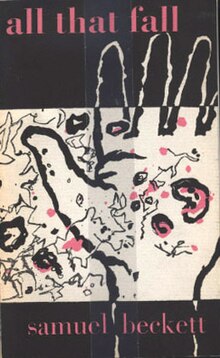| All That Fall | |
|---|---|
 All That Fall: A Play for Radio, London: Faber and Faber, 1957 | |
| Written by | Samuel Beckett |
| Characters | Maddy Rooney |
| Date premiered | 1957 |
| Original language | English |
| Genre | Radio play |
| Setting | Country road, railway station |
All That Fall is a one-act radio play by Samuel Beckett produced following a request[1] from the BBC. It was written in English and completed in September 1956. The autograph copy is titled Lovely Day for the Races. It was published in French, in a translation by Robert Pinget revised by Beckett himself,[2] as Tous ceux qui tombent.
When the germ of All that Fall came to him, Beckett wrote to a friend, Nancy Cunard:
- "Never thought about radio play technique but in the dead of t’other night got a nice gruesome idea full of cartwheels and dragging of feet and puffing and panting which may or may not lead to something."[3]
Although the play was written quickly and with few redrafts, the subject matter was deeply personal, causing Beckett to sink into what he called "a whirl of depression"[4] when he wrote to his US publisher Barney Rosset in August. In fact, in September "he cancelled all his appointments in Paris for a week simply because he felt wholly incapable of facing people",[5] and worked on the script until its completion.
It was first broadcast on the BBC Third Programme on 13 January 1957, featuring Mary O'Farrell as Maddy Rooney with J. G. Devlin as her husband, Dan. Soon-to-be Beckett regulars, Patrick Magee and Jack MacGowran also had small parts. The producer was Donald McWhinnie.
- ^ It has been reported that Beckett wrote this play following a commission from the BBC. This is not correct. Hugh Kenner advises that Beckett had written only some of his works at the suggestion of others and that these did not figure among his very best. Kenner remarks, "But suggestions – not commissions, since he will not regard an arrangement as binding until he has in fact been able to execute the work – suggestions, then, have led him into adventures with several media he would likely not otherwise have explored." – Kenner, H., A Reader’s Guide to Samuel Beckett, (London: Thames and Hudson Ltd, 1973), p 159
- ^ Samuel Beckett, Georges Craig (editor), The Letters of Samuel Beckett. Volume 3; 1957–1965, (Cambridge University Press, 2014), letter from Beckett to Christian Lugdivsen, 6 August 1957.
- ^ Letter to Nancy Cunard, 5 June 1956. Quoted in Knowlson, J., ‘'Damned to Fame: The Life of Samuel Beckett'’ (London: Bloomsbury, 1996),:p 428
- ^ Samuel Beckett to Barney Rosset, 23 August 1956. Quoted in Knowlson, J., ‘'Damned to Fame: The Life of Samuel Beckett'’ (London: Bloomsbury, 1996), p 430
- ^ Knowlson, J., ‘'Damned to Fame: The Life of Samuel Beckett'’ (London: Bloomsbury, 1996), pp 430,431